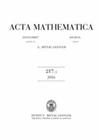Planar orthogonal polynomials and boundary universality in the random normal matrix model
IF 6.7
1区 数学
Q1 MATHEMATICS
引用次数: 43
Abstract
We prove that the planar normalized orthogonal polynomials $P_{n,m}(z)$ of degree $n$ with respect to an exponentially varying planar measure $e^{-2mQ(z)}\mathrm{dA}(z)$ enjoy an asymptotic expansion \[ P_{n,m}(z)\sim m^{\frac{1}{4}}\sqrt{\phi_\tau'(z)}[\phi_\tau(z)]^n e^{m\mathcal{Q}_\tau(z)}\left(\mathcal{B}_{0,\tau}(z) +\frac{1}{m}\mathcal{B}_{1,\tau}(z)+\frac{1}{m^2} \mathcal{B}_{2,\tau}(z)+\ldots\right), \] as $n=m\tau\to\infty$. Here $\mathcal{S}_\tau$ denotes the droplet, the boundary of which is assumed to be a smooth, simple, closed curve, and $\phi_\tau$ is a conformal mapping $\mathcal{S}_\tau^c\to\mathbb{D}_e$. The functions $\mathcal{Q}_\tau$ and $\mathcal{B}_{j,\tau}(z)$ are bounded holomorphic functions which may be computed in terms of $Q$ and $\mathcal{S}_\tau$. We apply these results to prove universality at the boundary for regular droplets in the random normal matrix model, i.e., that the limiting rescaled process is the random process with correlation kernel $$ \mathrm{k}(\xi,\eta)= e^{\xi\bar\eta\,-\frac12(\lvert\xi\rvert^2+\lvert \eta\rvert^2)} \operatorname{erf}(\xi+\bar{\eta}). $$ A key ingredient in the proof of the asymptotic expansion is the construction of an {orthogonal foliation} -- a smooth flow of closed curves near $\partial\mathcal{S}_\tau$, on each of which $P_{n,m}$ is orthogonal to lower order polynomials, with respect to an induced measure. To compute the coefficients, we develop an algorithm which determines $\mathcal{B}_{j,\tau}$ up to any desired order in terms of inhomogeneous Toeplitz kernel conditions.随机正规矩阵模型中的平面正交多项式与边界普适性
证明了阶$n$的平面归一化正交多项式$P_{n,m}(z)$对指数变化平面测度$e^{-2mQ(z)}\mathrm{dA}(z)$有渐近展开\[ P_{n,m}(z)\sim m^{\frac{1}{4}}\sqrt{\phi_\tau'(z)}[\phi_\tau(z)]^n e^{m\mathcal{Q}_\tau(z)}\left(\mathcal{B}_{0,\tau}(z) +\frac{1}{m}\mathcal{B}_{1,\tau}(z)+\frac{1}{m^2} \mathcal{B}_{2,\tau}(z)+\ldots\right), \]为$n=m\tau\to\infty$。其中$\mathcal{S}_\tau$表示液滴,假设液滴边界为光滑、简单、封闭曲线,$\phi_\tau$为保角映射$\mathcal{S}_\tau^c\to\mathbb{D}_e$。函数$\mathcal{Q}_\tau$和$\mathcal{B}_{j,\tau}(z)$是有界全纯函数,可以用$Q$和$\mathcal{S}_\tau$来计算。我们应用这些结果来证明随机正态矩阵模型中规则液滴在边界处的普适性,即极限重标过程是具有相关核的随机过程$$ \mathrm{k}(\xi,\eta)= e^{\xi\bar\eta\,-\frac12(\lvert\xi\rvert^2+\lvert \eta\rvert^2)} \operatorname{erf}(\xi+\bar{\eta}). $$证明渐近展开的一个关键因素是{正交叶状}的构造——在$\partial\mathcal{S}_\tau$附近的一个平滑的闭曲线流,其中每个$P_{n,m}$与低阶多项式正交,相对于一个诱导测度。为了计算系数,我们开发了一种算法,该算法确定$\mathcal{B}_{j,\tau}$在非齐次Toeplitz核条件下的任何期望阶。
本文章由计算机程序翻译,如有差异,请以英文原文为准。
求助全文
约1分钟内获得全文
求助全文
来源期刊

Acta Mathematica
数学-数学
CiteScore
6.00
自引率
2.70%
发文量
6
审稿时长
>12 weeks
期刊介绍:
Publishes original research papers of the highest quality in all fields of mathematics.
 求助内容:
求助内容: 应助结果提醒方式:
应助结果提醒方式:


